Not Private Eye
by Tony Quinn
As chairman of Maxwell Communication Corporation and Mirror Group Newspapers in 1986, Robert Maxwell was one of the powerful people in British publishing. His empire controlled national newspapers, magazines, books and some of the biggest printing works in the country. However, Private Eye and its editors, Richard Ingrams and then Ian Hislop, spent years trying to show he was a crook, losing several libel cases in the process, before Maxwell was lost at sea from his yacht. Then, it came to light that Maxwell had been stealing from the pension schemes of his companies for years.
Maxwell was born Ján Ludvík Hoch in Czechoslovakia and fought for the British during the war, gaining the rank of captain. It was during this time that he changed his name. In 1951, he bought Pergamon Press and built it up as an academic book and journal publisher. His resulting wealth enabled him to become a Labour MP in 1964, a post he held until 1970. However, in 1969, he was investigated by the Department of Trade and Industry over an attempted takeover by a US company, Leasco. The DTI's investigators concluded that Maxwell was 'not a person who can be relied on to exercise proper stewardship of a publicly quoted company'. Maxwell lost control of Pergamon until 1974.
Rivalry with Rupert Murdoch
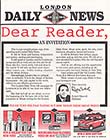 Maxwell's face appeared in many of his papers, including this preview of the London Daily News in 1987 |
A lifelong rivalry with Rupert Murdoch began in 1969 when the Australian beat Maxwell to buy the News of the World and the Sun. Maxwell ran his empire through a holding company in Liechtenstein, which meant he could keep much of his activities secret. In 1981 Maxwell bought the British Printing Corporation and changed the name to Maxwell Communication Corporation plc in 1983. In July 1984 Maxwell bought Mirror Group Newspapers from Reed International. This gave him control of the Daily Mirror, the Sunday Mirror, the Scottish Daily Record and Sunday Mail in addition to publishing and television interests. The Mirror went head-to-head with Murdoch's Sun in trying to outbid each other with '£1m bingo' splashed over their front pages. In 1987, Maxwell bought the Fleetway comic division of IPC. Also in that year, he launched the London Daily News to challenge the Standard and Evening News but this only lasted about 12 months. |
In May 1990, Maxwell launched The European as a colour weekly broadsheet with a brief to back ‘supporters of the integration of Europe’. However, in November 1991, Maxwell went missing from his yacht, Lady Ghislaine, in the Canary Islands. His body was later found and he was buried in Jerusalem. The official verdict was accidental drowning but others believe he may have committed suicide or was murdered, possibly by agents of the Israeli intelligence service, Mossad.
Maxwell and Private Eye
Rumours of dodgy dealings swirled around Maxwell for decades. However, he used his wealth to fund teams of lawyers who threatened any critics with libel actions. For most of the press, Maxwell was a no-go zone. Private Eye mocked Maxwell with the nicknames 'Cap'n Bob' and 'The Bouncing Czech' but was unable to do much more. In 1984, Private Eye ran a 'Spot the worthless Czech' cover of Maxwell. On several occasions, the magazine was sued by Maxwell, the most notable of which led to the publication of Not Private Eye by Maxwell.
In 1986, Maxwell launched Not Private Eye to celebrate and publicise winning £55,000 in a libel trial against Private Eye, which had suggested Maxwell had tried to bribe his way to a peerage. It was a one-off newsprint tabloid that ran to 48 pages. The spoof, dated 10 December, cost 40p. The print run was reported at 600,000 and 1m copies in different publications.
Maxwell gave his account of the trial in Malice in Wonderland. The book was compiled by Mirror staff: reporter John Jackson, book editor Peter Donnelly and Joe Haines, political editor and former press secretary to Harold Wilson.
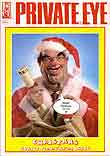 The Christmas 1986 issue of Private Eye was a fund-raising special |
The Christmas 1986 issue of Private Eye was a fund-raising special (£1 instead of the usual
45p) to try to pay off the costs of the libel – estimated at £255,000
in damages and legal fees. Pressdram, Private
Eye's publisher, expected to sell 240,000
copies. The colour cover showed Maxwell holding a writ and a sack,
saying 'Happy Christmas to you all.' The issue thanked 72 people
who had made donations to cover the magazine's costs.
WH Smith and Menzies, which between them accounted for half of all magazine sales, refused to stock the Christmas Private Eye, and then Not Private Eye, on legal grounds. However, they relented. Final sales of the rivals were not reported. The Times, in an article 'Who wants what' for Christmas (21 December), quoted Ian Hislop: 'I'd like a paper compressor so I could turn all unsold copies of Not Private Eye into handy combustible fuel bricquets to distribute to the poor and needy because it's the season of good will.' |
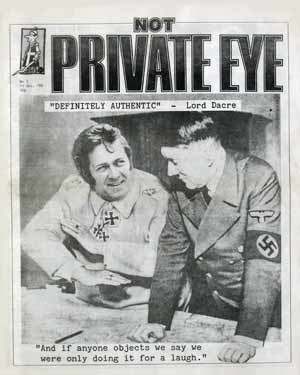
|
The cover of Not Private Eye showed the head of Private
Eye editor Richard Ingrams superimposed on the body of Hermann Goering with Hitler. The caption read: 'If anyone
objects we say we were only doing it for a laugh.' Above the image is 'Definitely authentic – Lord Dacre.' This referred to Hugh Trevor-Roper, the historian who, in 1983, wrongly authenticated 60 volumes of Hitler's diaries. German magazine Stern, Rupert Murdoch's Sunday Times and US title Newsweek were humiliated when it emerged they had paid millions to 51-year-old journalist Gerd Heidemann for the fakes. |
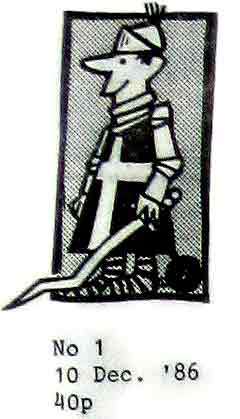 |
Not 'Gnitty'The masthead mascot of Private Eye is 'Gnitty', who was drawn by one of the Eye's founders, Willie Rushton. It depicts a Crusader (which was the mascot of the Daily Express newspaper) based on John Wells. The cover of Not Private Eye showed a subtly altered version of Gnitty (left): he is facing the wrong way and is smiling. |
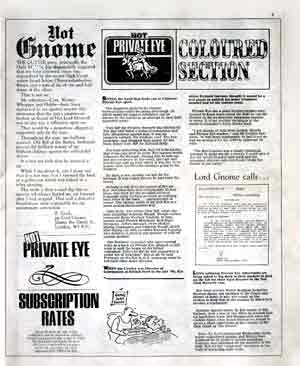 |
The parody of Private Eye continued right the way through Not .
It covered both editorial and advertising, such as 'Ingrams late bottled sour
grapes', 'The Macingram, the dolt' and 'Hislop's slipper socks'.
Regular features were lampooned, such as Lord Gnome's
page (9, left). There was also real advertising sold to companies such as Comet, Currys, Virgin, Queensway and Payless DIY. |
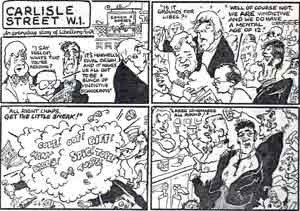 |
Not carried spoofs of the cartoon strips. Most of these were based on the supposed behaviour of the editorial team, such as 'Carlisle St, An everyday story of libelling folk.' The issue also reprinted negative stories about the magazine. | |
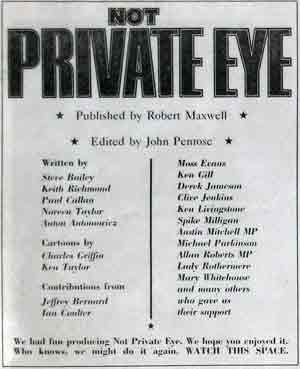 |
The
flannel panel listed Maxwell as publisher and John Penrose as
editor. It was written by: Steve Bailey, Keith Richmond, Paul
Callan, Noreen Taylor and Anton Antonowicz. Cartoons were by
Charles Griffin and Ken Taylor. Contributors were: Jeffrey Bernard, Ian Coulter, Moss Evans, Ken Gill, Derek Jameson, Clive Jenkins, Ken Livingstone, Spike Milligan, Austin Mitchell MP, Michael Parkinson, Allan Roberts MP, Lady Rothermere and Mary Whitehouse |
|



